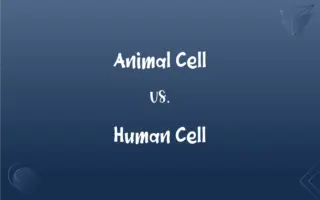Difference vs. Different: What's the Difference?
Edited by Janet White || By Harlon Moss || Updated on January 4, 2024
'Difference' is a noun referring to the state or quality of being unlike or distinct, while 'different' is an adjective describing something as not the same as another or as distinct.

Key Differences
'Difference' refers to the quality or condition that distinguishes one thing from another, emphasizing the distinction or discrepancy between entities. 'Different', as an adjective, is used to describe entities that are not the same, highlighting their distinct characteristics.
In context, 'difference' is often used to specify what makes two or more things distinct, whereas 'different' is applied directly to an object or concept to indicate that it is not identical to another.
'Difference' can also imply a numerical distinction, as in mathematics or measurements. In contrast, 'different' can be used to indicate a variety or range of things, showing diversity or variety.
The usage of 'difference' often involves a comparison, explicitly mentioning the aspects that are dissimilar. 'Different', however, can stand alone to denote non-similarity without specifying the aspects.
'Difference' is a concept highlighting distinctions, while 'different' is a descriptive term used to classify something as distinct from others.
ADVERTISEMENT
Comparison Chart
Part of Speech
Noun – refers to the state of being distinct.
Adjective – describes something as distinct.
Example Usage
"The difference between the two is striking."
"These two colors are different."
Context
Often used in comparisons or discussions about distinctions.
Used to describe or classify entities as distinct.
Relationship to Entities
Refers to the distinction itself.
Describes the entities as being non-identical.
Implication
May imply a relationship or contrast between entities.
Directly states that something is not the same as another.
ADVERTISEMENT
Difference and Different Definitions
Difference
A noticeable disparity or variation.
There's a significant difference in price between these models.
Different
Varying from a norm or standard.
Her style of writing is different than traditional methods.
Difference
Distinctive characteristic of something.
The cultural difference of each country fascinates me.
Different
Unusual and not typical.
He has a different approach to solving problems.
Difference
The result of subtracting one number from another.
The difference between 15 and 10 is 5.
Different
Unique or individual.
Each artist has a different perspective.
Difference
A point or way in which things are not the same.
The main difference between the two books is their length.
Different
Not the same as another; distinct.
This recipe tastes different from the one I usually make.
Difference
A disagreement, dispute, or debate.
They settled their differences amicably.
Different
Distinctly separate; diverse.
We come from different backgrounds.
Difference
The quality or condition of being unlike or dissimilar.
Different
Unlike in form, quality, amount, or nature; dissimilar
Took different approaches to the problem.
Difference
An instance of disparity or unlikeness
There is a big difference in sound between a clarinet and an oboe.
FAQs
Can 'difference' refer to a variety of things?
Yes, 'difference' can refer to a variety of distinctions between things, ideas, or people.
Is 'difference' used in mathematics?
Yes, in mathematics, 'difference' refers to the result of subtracting one number from another.
How is 'difference' used in a debate?
In a debate, 'difference' often refers to diverging points of view or opinions.
Can 'different' be used in a positive context?
Absolutely, 'different' can be positive, highlighting diversity or innovation.
Can 'difference' imply a conflict?
Yes, 'difference' can imply a disagreement or conflict, as in 'a difference of opinion'.
Is 'different' used to describe personality traits?
Yes, 'different' can be used to describe distinct personality traits.
Is 'different' always a comparison?
'Different' often implies a comparison but can be used to describe something as distinct on its own.
Does 'different' always mean better or worse?
No, 'different' is neutral; it does not inherently mean better or worse.
Can 'different' imply a change?
Yes, 'different' can imply a change from a previous state or norm.
Does 'different' always mean opposite?
No, 'different' means not the same, but not necessarily the opposite.
Can 'difference' be used to describe physical attributes?
Yes, 'difference' can describe physical distinctions between objects or people.
Can 'difference' be a point of strength?
Yes, differences can be strengths, bringing diverse perspectives and ideas.
Can 'different' indicate uniqueness?
Yes, 'different' can indicate something unique or distinct from the norm.
Is 'different' used in art?
In art, 'different' is often used to describe unique styles or perspectives.
Is 'difference' subjective or objective?
'Difference' can be both subjective and objective, depending on context.
Is 'difference' always noticeable?
No, sometimes a 'difference' can be subtle and not immediately noticeable.
Does 'different' always mean distinct?
'Different' generally means distinct, but the degree of distinction can vary.
How is 'difference' used in social contexts?
In social contexts, 'difference' often refers to cultural, societal, or personal distinctions.
How does 'difference' relate to individuality?
'Difference' can highlight individuality by showing how something is distinct from others.
Can 'different' be used in science?
Yes, in science, 'different' is used to describe varying characteristics or results.
About Author
Written by
Harlon MossHarlon is a seasoned quality moderator and accomplished content writer for Difference Wiki. An alumnus of the prestigious University of California, he earned his degree in Computer Science. Leveraging his academic background, Harlon brings a meticulous and informed perspective to his work, ensuring content accuracy and excellence.
Edited by
Janet WhiteJanet White has been an esteemed writer and blogger for Difference Wiki. Holding a Master's degree in Science and Medical Journalism from the prestigious Boston University, she has consistently demonstrated her expertise and passion for her field. When she's not immersed in her work, Janet relishes her time exercising, delving into a good book, and cherishing moments with friends and family.






































































